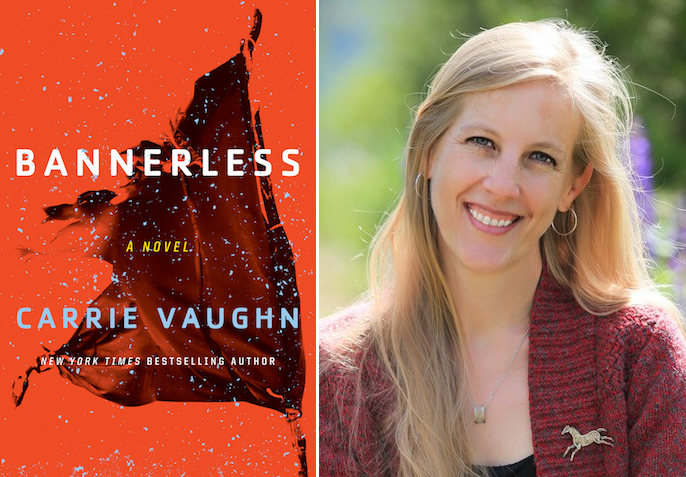The Philip K. Dick Award, presented annually for distinguished science fiction published in paperback form in the previous year, was announced at Norwescon 41 in SeaTac, Washington, on March 30.
Bannerless, Carrie Vaughn’s murder mystery set in a post-apocalyptic society shaped by population control, took home the 2018 Philip K. Dick Award, while fellow nominee Deji Bryce Olukotun received the special citation for his novel After the Flare.
Some tweets from the award ceremony at Norwescon:
Yay! Carrie Vaughn wins the Philip K. Dick Award for her novel BANNERLESS. Congrats, Carrie! pic.twitter.com/dSELqdck8V
— Patrick Swenson (@patrick_swenson) March 31, 2018
Honored to have won the special citation of the 2018 Philip K. Dick Award for After the Flare!! #NWC41 #SciFi pic.twitter.com/32DwU5sgQD
— Deji Bryce Olukotun (@olutron) March 31, 2018
More about Bannerless:
Decades after economic and environmental collapse destroys much of civilization in the United States, the Coast Road region isn’t just surviving but thriving by some accounts, building something new on the ruins of what came before. A culture of population control has developed in which people, organized into households, must earn the children they bear by proving they can take care of them and are awarded symbolic banners to demonstrate this privilege. In the meantime, birth control is mandatory.
Enid of Haven is an Investigator, called on to mediate disputes and examine transgressions against the community. She’s young for the job and hasn’t yet handled a serious case. Now, though, a suspicious death requires her attention. The victim was an outcast, but might someone have taken dislike a step further and murdered him?
In a world defined by the disasters that happened a century before, the past is always present. But this investigation may reveal the cracks in Enid’s world and make her question what she really stands for.
More about After the Flare, the sequel to Nigerians in Space:
A catastrophic solar flare reshapes our world order as we know it—in an instant, electricity grids are crippled, followed by devastating cyberattacks that paralyze all communication. With America in chaos, former NASA employee Kwesi Bracket works at the only functioning space program in the world, which just happens to be in Nigeria. With Europe, Asia, and the U.S. knocked off-line, and thousands of dead satellites about to plummet to Earth, the planet’s only hope rests with the Nigerian Space Program’s plan to launch a daring rescue mission to the International Space Station. Bracket and his team are already up against a serious deadline, but life on the ground is just as disastrous after the flare.
Nigeria has been flooded with advanced biohacking technologies, and the scramble for space supremacy has attracted dangerous peoples from all over Africa. What’s more: the militant Islamic group Boko Haram is slowly encroaching on the spaceport, leaving a trail of destruction, while a group of nomads has discovered an ancient technology more powerful than anything Bracket’s ever imagined.
With the clock ticking down, Bracket—helped by a brilliant scientist from India and an eccentric lunar geologist—must confront the looming threats to the spaceport in order to launch a harrowing rescue mission into space.
The award is sponsored by the Philadelphia Science Fiction Society and the Philip K. Dick Trust, and the award ceremony is sponsored by the Northwest Science Fiction Society.










